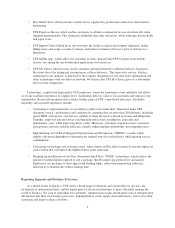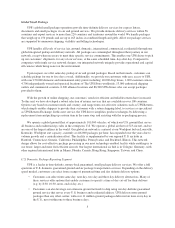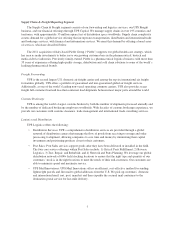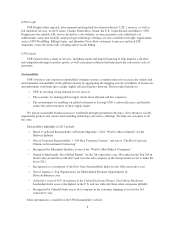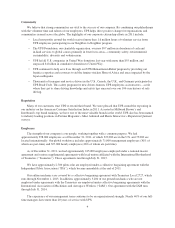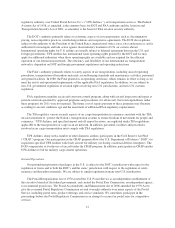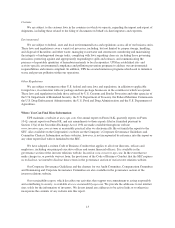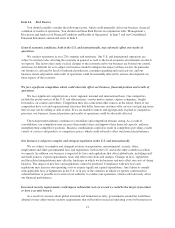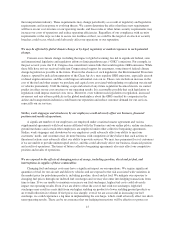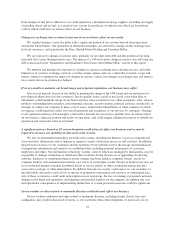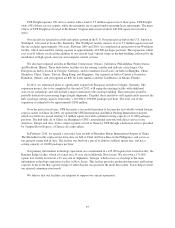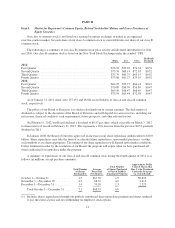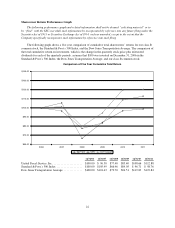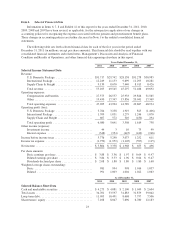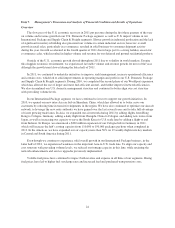UPS 2011 Annual Report Download - page 26
Download and view the complete annual report
Please find page 26 of the 2011 UPS annual report below. You can navigate through the pages in the report by either clicking on the pages listed below, or by using the keyword search tool below to find specific information within the annual report.Item 1A. Risk Factors
You should carefully consider the following factors, which could materially affect our business, financial
condition or results of operations. You should read these Risk Factors in conjunction with “Management’s
Discussion and Analysis of Financial Condition and Results of Operations” in Item 7 and our Consolidated
Financial Statements and related notes in Item 8.
General economic conditions, both in the U.S. and internationally, may adversely affect our results of
operations.
We conduct operations in over 220 countries and territories. Our U.S. and international operations are
subject to normal cycles affecting the economy in general, as well as the local economic environments in which
we operate. The factors that create cyclical changes to the economy and to our business are beyond our control,
and it may be difficult for us to adjust our business model to mitigate the impact of these factors. In particular,
our business is affected by levels of industrial production, consumer spending and retail activity, and our
business, financial position and results of operations could be materially affected by adverse developments in
these aspects of the economy.
We face significant competition which could adversely affect our business, financial position and results of
operations.
We face significant competition on a local, regional, national and international basis. Our competitors
include the postal services of the U.S. and other nations, various motor carriers, express companies, freight
forwarders, air couriers and others. Competition may also come from other sources in the future. Some of our
competitors have cost and organizational structures that differ from ours and may offer services and pricing terms
that we may not be willing or able to offer. If we are unable to timely and appropriately respond to competitive
pressures, our business, financial position and results of operations could be adversely affected.
The transportation industry continues to consolidate and competition remains strong. As a result of
consolidation, our competitors may increase their market share and improve their financial capacity, and may
strengthen their competitive positions. Business combinations could also result in competitors providing a wider
variety of services and products at competitive prices, which could adversely affect our financial performance.
Our business is subject to complex and stringent regulation in the U.S. and internationally.
We are subject to complex and stringent aviation, transportation, environmental, security, labor,
employment and other governmental laws and regulations, both in the U.S. and in the other countries in which
we operate. In addition, our business is impacted by laws and regulations that affect global trade, including tariff
and trade policies, export requirements, taxes and other restrictions and charges. Changes in laws, regulations
and the related interpretations may alter the landscape in which we do business and may affect our costs of doing
business. The impact of new laws and regulations cannot be predicted. Compliance with new laws and
regulations may increase our operating costs or require significant capital expenditures. Any failure to comply
with applicable laws or regulations in the U.S. or in any of the countries in which we operate could result in
substantial fines or possible revocation of our authority to conduct our operations, which could adversely affect
our financial performance.
Increased security requirements could impose substantial costs on us and we could be the target of an attack
or have a security breach.
As a result of concerns about global terrorism and homeland security, governments around the world have
adopted or may adopt stricter security requirements that will result in increased operating costs for businesses in
14


